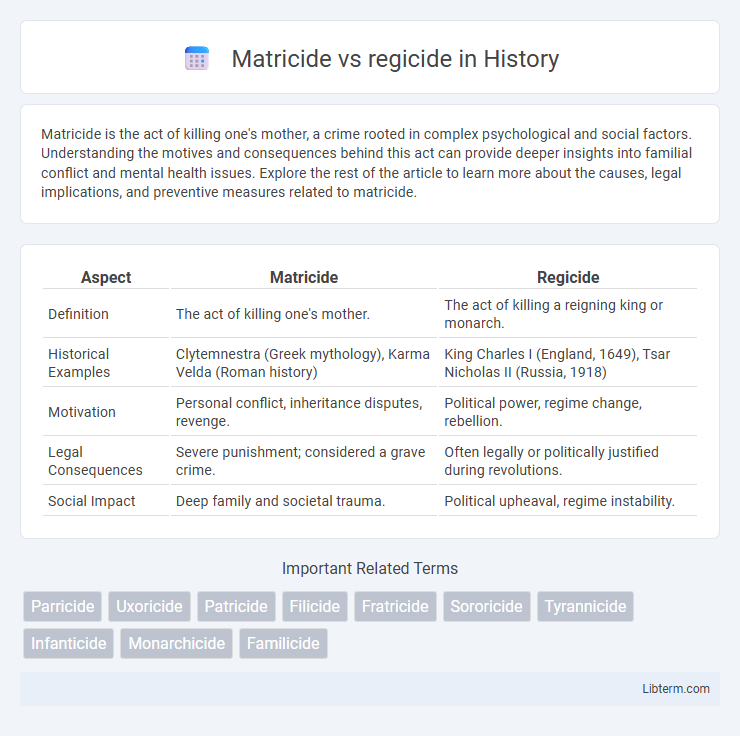Matricide is the act of killing one's mother, a crime rooted in complex psychological and social factors. Understanding the motives and consequences behind this act can provide deeper insights into familial conflict and mental health issues. Explore the rest of the article to learn more about the causes, legal implications, and preventive measures related to matricide.
Table of Comparison
| Aspect | Matricide | Regicide |
|---|---|---|
| Definition | The act of killing one's mother. | The act of killing a reigning king or monarch. |
| Historical Examples | Clytemnestra (Greek mythology), Karma Velda (Roman history) | King Charles I (England, 1649), Tsar Nicholas II (Russia, 1918) |
| Motivation | Personal conflict, inheritance disputes, revenge. | Political power, regime change, rebellion. |
| Legal Consequences | Severe punishment; considered a grave crime. | Often legally or politically justified during revolutions. |
| Social Impact | Deep family and societal trauma. | Political upheaval, regime instability. |
Definition of Matricide and Regicide
Matricide refers to the act of killing one's own mother, while regicide denotes the killing of a reigning monarch or king. Both terms originate from Latin roots: "mater" meaning mother for matricide, and "rex" meaning king for regicide. These definitions highlight distinct categories of homicide differentiated by the victim's relationship to the perpetrator or societal role.
Historical Context of Matricide
Matricide, the act of killing one's mother, has been documented in various historical societies, often viewed as a profound violation of familial and social norms. Cases of matricide appear in ancient texts and legal codes, reflecting its severe moral and legal consequences compared to other forms of homicide. Unlike regicide, which involves the politically motivated killing of a monarch, matricide is primarily understood within the context of familial conflict and psychological disturbance.
Historical Context of Regicide
Regicide, the intentional killing of a monarch, has shaped numerous historical revolutions and power transitions, notably during the English Civil War with the execution of King Charles I in 1649. This act often symbolized a profound challenge to dynastic rule and authority, signaling shifts toward republicanism or new political orders. Unlike matricide, which targets a familial figure, regicide carries significant political and social ramifications, reflecting broader societal upheaval and resistance to autocratic governance.
Psychological Factors Behind Matricide
Matricide, the act of killing one's mother, often stems from deep-rooted psychological issues such as childhood abuse, unresolved trauma, and severe mental illness. Unlike regicide, which is primarily politically motivated, matricide frequently involves intense personal conflict and emotional disturbances within the family unit. Research indicates that perpetrators of matricide commonly exhibit histories of domestic violence, neglect, and psychiatric disorders such as schizophrenia or bipolar disorder.
Political Motivations for Regicide
Regicide, the deliberate killing of a monarch, is often driven by complex political motivations aimed at seizing power, correcting perceived tyranny, or triggering regime change. Historical cases such as the execution of King Charles I of England illustrate how regicides seek to dismantle existing authority structures and legitimize new governance systems. In contrast, matricide--the killing of one's mother--typically involves personal or familial motives and rarely carries broad political implications or goals.
Legal Consequences of Matricide vs Regicide
Matricide, the act of killing one's mother, is prosecuted as a severe homicide offense with penalties ranging from long-term imprisonment to life sentences under most legal systems globally. Regicide, the killing of a reigning monarch, historically carried draconian consequences such as execution or high treason charges, reflecting its political gravity; in modern constitutional monarchies, legal responses vary but often include life imprisonment or capital punishment where still applicable. Both crimes invoke intense legal scrutiny due to their societal and symbolic impact, with regicide often viewed as an attack on state sovereignty, while matricide is primarily treated as a grave familial and criminal violation.
Famous Cases of Matricide in History
Matricide, the act of killing one's mother, has marked several notorious historical cases, contrasting with regicide, the killing of a monarch. The case of Nero, infamous Roman Emperor who ordered the murder of his mother Agrippina the Younger in AD 59, exemplifies matricide linked to power struggles. Another notable instance is Elizabeth Bathory, a Hungarian noblewoman accused of killing her own mother during her reign of terror in the 16th century.
Notable Instances of Regicide Worldwide
Notable instances of regicide worldwide include the execution of King Louis XVI of France during the French Revolution in 1793, marking a pivotal moment in European history. Another significant example is the assassination of Tsar Nicholas II of Russia and his family in 1918, which ended the Romanov dynasty and signaled the rise of Soviet power. The killing of King Charles I of England in 1649 remains a landmark event, symbolizing the conflict between monarchy and parliamentary authority.
Cultural Perceptions: Matricide vs Regicide
Matricide, the act of killing one's mother, is universally condemned and often viewed as a profound violation of familial and moral bonds across cultures, symbolizing extreme betrayal and emotional disturbance. Regicide, the killing of a king or monarch, carries diverse cultural perceptions ranging from treason and sacrilege in monarchic societies to sometimes being seen as a catalyst for political change or revolution. The cultural narratives surrounding regicide frequently intertwine with themes of power, legitimacy, and social upheaval, while matricide consistently invokes deep psychological and ethical condemnation.
Societal Impact and Legacy
Matricide, the act of killing one's mother, often results in deep familial trauma and stigmatization, impacting social cohesion within communities due to its violation of fundamental family bonds. Regicide, the killing of a reigning monarch, typically triggers significant political upheaval, power vacuums, and shifts in governance, influencing national stability and historical legacies. While matricide primarily affects interpersonal relationships and cultural norms surrounding family, regicide reshapes societal structures and can lead to profound changes in law, authority, and collective memory.
Matricide Infographic

 libterm.com
libterm.com